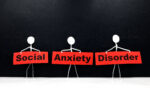What Causes Social Anxiety Disorder?

Everyone experiences a little bit of social anxiety at times. Whether we’re arriving at a party where there are lots of new people or we’re finding a group to sit with for lunch at a new workplace, the nuances of social interaction leave plenty of room for trepidation.
The fear of being judged or feeling unwelcome is a normal fear in certain situations. However, when a person is unable to overcome initial anxiety and over time the fear builds and interferes with building and maintaining relationships, social anxiety may be underlying the distress.
If you’re curious about social anxiety or think you may be affected by this condition, here’s the scoop on what you’ll want to know.
What is social anxiety?
Social anxiety, or social phobia, is a type of anxiety disorder. According to John Hopkins University, a phobia is an uncontrollable, irrational and lasting fear of a certain thing. Therefore, a social phobia is an intense and overwhelming fear of social situations.
Someone with social anxiety disorder will struggle in everyday interactions. A meeting at work, ordering a coffee, making eye contact, starting a conversation or even speaking to family and friends can provoke painful feelings of self-consciousness and embarrassment.
A person affected by social anxiety, in order to escape the uncomfortable feelings that accompany social events, will begin to avoid any situation or trigger that could lead to stress, even if that would seem extraordinary to another person. These avoidance behaviors can cause severe disruption to a normal life.
What causes social anxiety disorder?
Social anxiety disorder, like other anxiety disorders, does not have a single root impetus. There are a few categories of potential risk factors that can contribute to the onset of anxiety.
- Genetics: someone who has a family history of anxiety may be predisposed to anxiety
- Learned behavior: in the same ways that our birth parents influence our genes, those who raise us and are around us during adolescence have a big impact on our behavior later on
- Neurological factors: there are specific genes and hormones that have an affect on a person’s experience of anxiety. The section of the brain that regulates the fear response is called the amygdala, and whatever impacts the amygdala, impacts anxiety
- Environment: the community and family circle that a person grows up with can impact anxiety. The school system and expectations in early childhood can influence this one way or another
- Individual personality: while an extroverted temperament can also struggle with social anxiety, there tends to be a greater percentage of social anxiety among people who are naturally withdrawn
- A stressful setting: adjusting to a new job, transitioning to college or living on your own, moving on from a relationship, experiencing the loss of a loved one and other major life challenges can provoke social anxiety
- A chronic or observable condition: someone who is affected by a medical or mental health condition, whether or not it is visible, can feel self-conscious or nervous about being judged for their state
There are various answers for what causes social anxiety disorder, but it’s important to remember that there’s never a single reason. Moreover, someone who faces the above risk factors may never be faced with social anxiety.
How to overcome social anxiety
The stress that comes along with social anxiety can feel crippling. Living your daily life while avoiding potential triggers can feel exhausting and unbearable.
Thankfully, you don’t have to live with anxiety. While anxiety is a clinical condition that may have flare ups even after treatment, the most problematic symptoms can be managed when you seek healing and change.
Here are some tips for overcoming social anxiety
- Social anxiety treatment
Social anxiety disorder is treatable, and there are two main forms of professional treatment. The first is therapy, often in the form of cognitive behavior therapy or exposure therapy. These frameworks emphasize managing thoughts and feelings to improve distress tolerance. The second main line of social anxiety treatment is through medication, specifically antidepressants.
- Practice, practice, practice
Social anxiety is cyclical. The avoidance behaviors are reinforcing because not only do they temporarily keep a person from the nervousness of interacting. Over time, a person will avoid more and more, leading to a lifestyle that is nearly impossible to maintain.
The best antidote to the cycle of anxiety is to slowly engage in social events, even though they are anxiety-provoking. You’ll find with time and therapy that the process gets easier.
- Find jobs for people with social anxiety
Living with social anxiety in a busy and demanding world can feel like too big of a step to take to start. It’s possible that a crazy-stressful or high-stakes job is contributing to intense fear. It may be that a career change is in order.
If you’re looking for jobs for people with social anxiety, consider a low-interaction field, like computer science, graphic design, laboratory technician, content writing, data entry and so forth. Changing up a big part of your day could make a big difference in how you feel the rest of your time.
Starting today
If substance use has contributed to anxiety, you’re not alone. Drug and alcohol addiction is one of the most common reasons for complex social fear. If you’re ready to find simultaneous help for addiction and mental illness, get help with Silvermist Recovery. Call today.





